Hello from Texas, where the family and I have been spending the last few days trying to get roots set down. Just getting caught up after the last couple of weeks of packing up the moving truck and searching for a home in this region. It’s been quite a process (picture the Clampetts, loaded down vehicles, but using a 26′ truck and no Jethro to carry the heavy stuff!), and we’re just starting to catch our breaths a little.
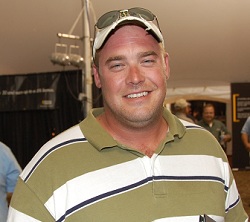 Wanted to pass along these interviews from the recent Wyffels Hybrids Corn Strategies event in Malcolm, Iowa, where I talked to a couple of producers who rely on the Wyffels brand and the company’s product development manager.
Wanted to pass along these interviews from the recent Wyffels Hybrids Corn Strategies event in Malcolm, Iowa, where I talked to a couple of producers who rely on the Wyffels brand and the company’s product development manager.
Marc Loes grows all Wyffels on his 600 acres around Cascade in Easter Iowa (along with feeding about 3,000 head of cattle). He says this event reinforces the idea that you really have to look at marketing a lot more.
You can hear or download my entire conversation with Marc here: Marc Loes
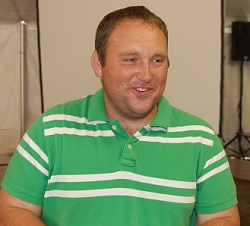 Eric Totemeier, who farms about 700 acres (2/3 corn and 1/3 soybeans) near Columbus Junction, Iowa, told me that the gathering with its multiple speakers was great, and the setting right next to a genuine Wyffels Hybrids corn field made it feel like home. But most importantly, and Marc echoed this sentiment, farmers are able to form a real partnership with their Wyffels representative. “There’s always out there with you through thick and thin.”
Eric Totemeier, who farms about 700 acres (2/3 corn and 1/3 soybeans) near Columbus Junction, Iowa, told me that the gathering with its multiple speakers was great, and the setting right next to a genuine Wyffels Hybrids corn field made it feel like home. But most importantly, and Marc echoed this sentiment, farmers are able to form a real partnership with their Wyffels representative. “There’s always out there with you through thick and thin.”
Listen to or download my entire conversation with Eric here: Eric Totemeier
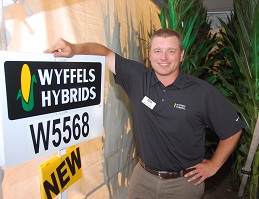 That’s music to the ears of Wyffels Product Development Manager, Brent Tharp, who showed off some of the company’s new hybrids that will be ready for next year’s spring planting. “[The farmers attending] like what they see. If you do walk a Wyffels lineup, you can see the diversity we have in our germplasm. Each hybrid is not the same.”
That’s music to the ears of Wyffels Product Development Manager, Brent Tharp, who showed off some of the company’s new hybrids that will be ready for next year’s spring planting. “[The farmers attending] like what they see. If you do walk a Wyffels lineup, you can see the diversity we have in our germplasm. Each hybrid is not the same.”
More of my conversation with Brent is available to listen to or to download here: Brent Tharp

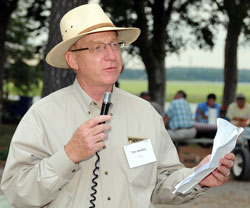 Conservation Technology Information Center Chairman Tim Healey,
Conservation Technology Information Center Chairman Tim Healey,  Not all the farmers I met during the Conservation in Action Tour were making presentations. One of them was Wayne Kirby, Virginia corn farmer and Chairman of the Virginia Corn Board. Wayne says a lot of people are interested in agriculture in their area and especially what’s happening with the Chesapeake Bay restoration effort.
Not all the farmers I met during the Conservation in Action Tour were making presentations. One of them was Wayne Kirby, Virginia corn farmer and Chairman of the Virginia Corn Board. Wayne says a lot of people are interested in agriculture in their area and especially what’s happening with the Chesapeake Bay restoration effort. 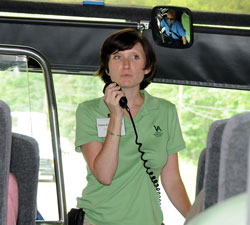 One of our Conservation in Action Tour bus speakers was Katie Kyger Frazier, V.P. Public Affairs,
One of our Conservation in Action Tour bus speakers was Katie Kyger Frazier, V.P. Public Affairs, 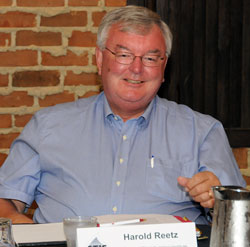 Harold Reetz is one of the board members for the Conservation Technology Information Center and has formed
Harold Reetz is one of the board members for the Conservation Technology Information Center and has formed 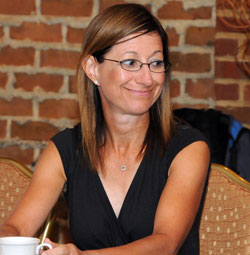 Representing
Representing 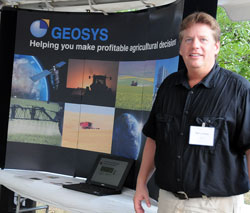 Precision ag was highlighted at the Nutrient Use Efficiency Expo during the Conservation in Action Tour by a company called Geosys represented by Don Lampker. Don says Geosys is a relatively small technology supply company. He says they do a lot with satellite imagery and have a product called
Precision ag was highlighted at the Nutrient Use Efficiency Expo during the Conservation in Action Tour by a company called Geosys represented by Don Lampker. Don says Geosys is a relatively small technology supply company. He says they do a lot with satellite imagery and have a product called 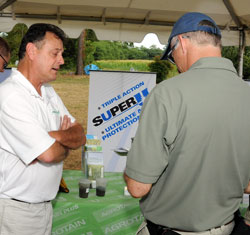 During the Nutrient Use Efficiency Expo on the Conservation in Action Tour our sponsor,
During the Nutrient Use Efficiency Expo on the Conservation in Action Tour our sponsor,